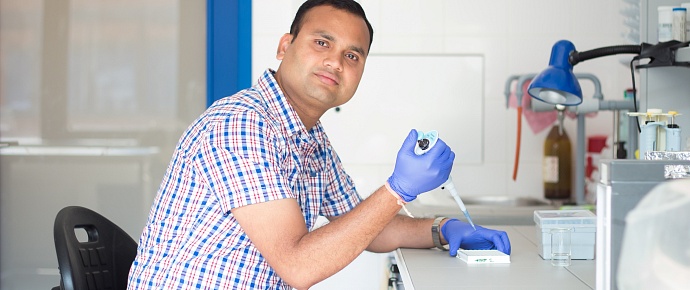SoMoPro - South Moravian Programme for Distinguished Researchers


We attract top-class scientists from abroad to research institutions in the region of South Moravia.
South Moravian Programme for Distinguished Researchers, SoMoPro, provides host institutions with financial support that covers the research costs, as well as personal expenses. It supports projects concerning science, medicine and technology.
Who can apply:
- scientists in possession of a doctoral degree or with at least 4 years of research experience
- foreign and Czech researchers who have spent at least 2 out of the last 3 years outside the Czech Republic
Selection is carried out by an international expert committee. The next call is planned for Autumn 2018.
Learn how to apply.
The programme is co-financed by Horizon 2020, Marie Skłodowska-Curie Actions and the South Moravian Region.
This project has received funding from the European Union’s Seventh Framework Programme for research, technological development and demonstration under grant agreement no 291782.

6th call for proposals under the SoMoPro Programme - Autumn 2016
WHO CAN APPLY AND HOW:
- Foreign and Czech scientists with doctoral degree or at least 4 years of research experience (full time equivalent) after obtaining an education that allows them to access doctoral programmes.
- Researchers who have not resided or carried out their activities in the Czech Republic for more than 12 months over the last 3 years. For scientists after a career break, we offer a special condition – they can enroll into the program if they have not lived and worked in the Czech Republic for more than 3 years in the last 5 years and at the same time have not been active in research for at least 12 months immediately prior to the deadline for submission of proposals.
Applicant submits only one project proposal in cooperation with the host institution from the South Moravian Region - see an overview of Host Institutions.
OTHER CONDITIONS:
- Supported research domains are defined by the regional Smart Specialisation Strategy of the South Moravian region.
- The duration of the fellowship must be at least 12 months and at most 36 months. The projects supported in the 6th Call may start as soon as March 2017 and end on 31 May 2020 at the latest.
6TH CALL TIMETABLE:
- call publication: 1st September 2016
- proposal registration: between 1st October and 30th November 2016
- eligibility check: December 2016
- peer review: from January till February 2017
- evaluation results announcement: March 2017
- negotiations of the grant agreements: from March till May 2017
SUPPORTING DOCUMENTS:
- Call for Proposals - Call for proposals under SoMoPro 3
- SoMoPro in a Nutshell - provides essential information about the programme
- Guide for Applicants - contains all the criteria, instructions and requirements for submitting a project proposal
- Application Template (Word) - the template includes a brief explanation on how to fill out the application correctly
- Grant Agreement Template - a model agreement between the host institution and The Regional Authority of the South Moravian Region (programme coordinator)
- Guide for Beneficiaries - guidelines for grant beneficiaries
SEMINAR FOR APPLICANTS:
We have organised an information seminar for SoMoPro applicants on 3rd and 12th October 2016. You can download the video from seminar HERE.The presentation is available HERE.
Several frequently asked questions and answers:
What does it mean “permanent contract”?
- It is an open-ended contract. It means that it is a contract for a particular period (e.g. 3 years), not a permanent contract.
I need an extra part-time employment along with SoMoPro full-time contract. Is it possible?
- Yes, it is possible from SoMoPro programme point of view but you have to report this fact in the project proposal with an adequate explanation. At the same time you need to check at your host institution if it is possible and for what time they enable you this additional part-time contract.
What if I do not manage to obtain the ethical clearance within the deadline 30th November 2016?
- It is possible to provide the ethical clearance additionally after the deadline, however an explanation must be provided in the project proposal with an expected date and if it is possible provide a copy of the request as well.
Does the number of team members in the host /partner institution include all the staff members related to the project?
- The number of team members should include only research workers who would directly participate in the proposed project. Therefore only the number of key team members should be stated without auxiliary staff.
STEERING COMMITTEE:
Steering Committee is an advisory body of SoMoPro programme and its task is to ensure scientific quality of the programme. It is responsible in particular for monitoring and approval of the evaluation and selection process. Steering Committee members participate also on annual monitoring of the assigned reports of the supported projects.
Statutes of the Steering Committee to download.
STEERING COMITTEE MEMBERS:
- Dr. Tanja Pettersen - Advanced Materials
- Ing. František Matúš, CSc. - Information and Communication Technologies
- prof. RNDr. Tomáš Opatrný, Dr. - Electronics and Photonics
- Dr. Irene Fassi - Advanced Manufacturing Technologies
- Doc. RNDr. Ladislav Burýšek, Ph.D. - Biotechnology and Biomedicine
Thematic RESEARCH priorities
Download Thematic research priorities.
Research domains and RESEARCH topics |
|
|
Material Research
|
|
|
Information and Communication Technologies
|
|
|
Electronics and Photonics
|
|
|
Advanced Manufacturing Technologies
|
|
|
Biotechnology and Biomedicine
|
1st & 2nd Call Fellows
3rd & 4th Call Fellows
5th & 6th Call Fellows
Doležal Michael
Telefon: 602 735 910
E-mail: michael.dolezal(at)jcmm.cz


